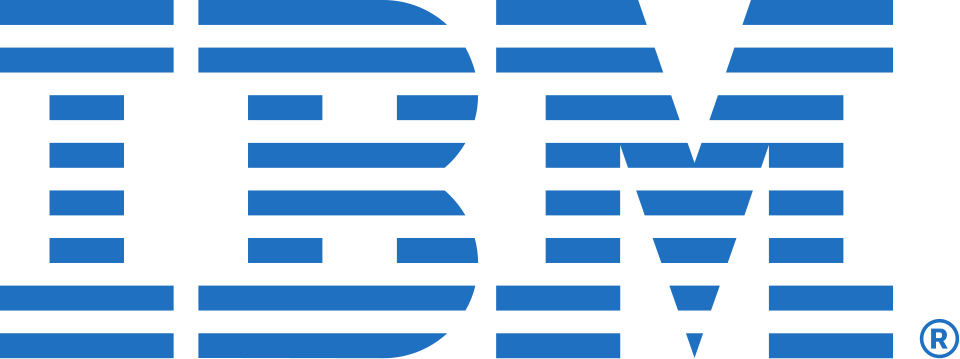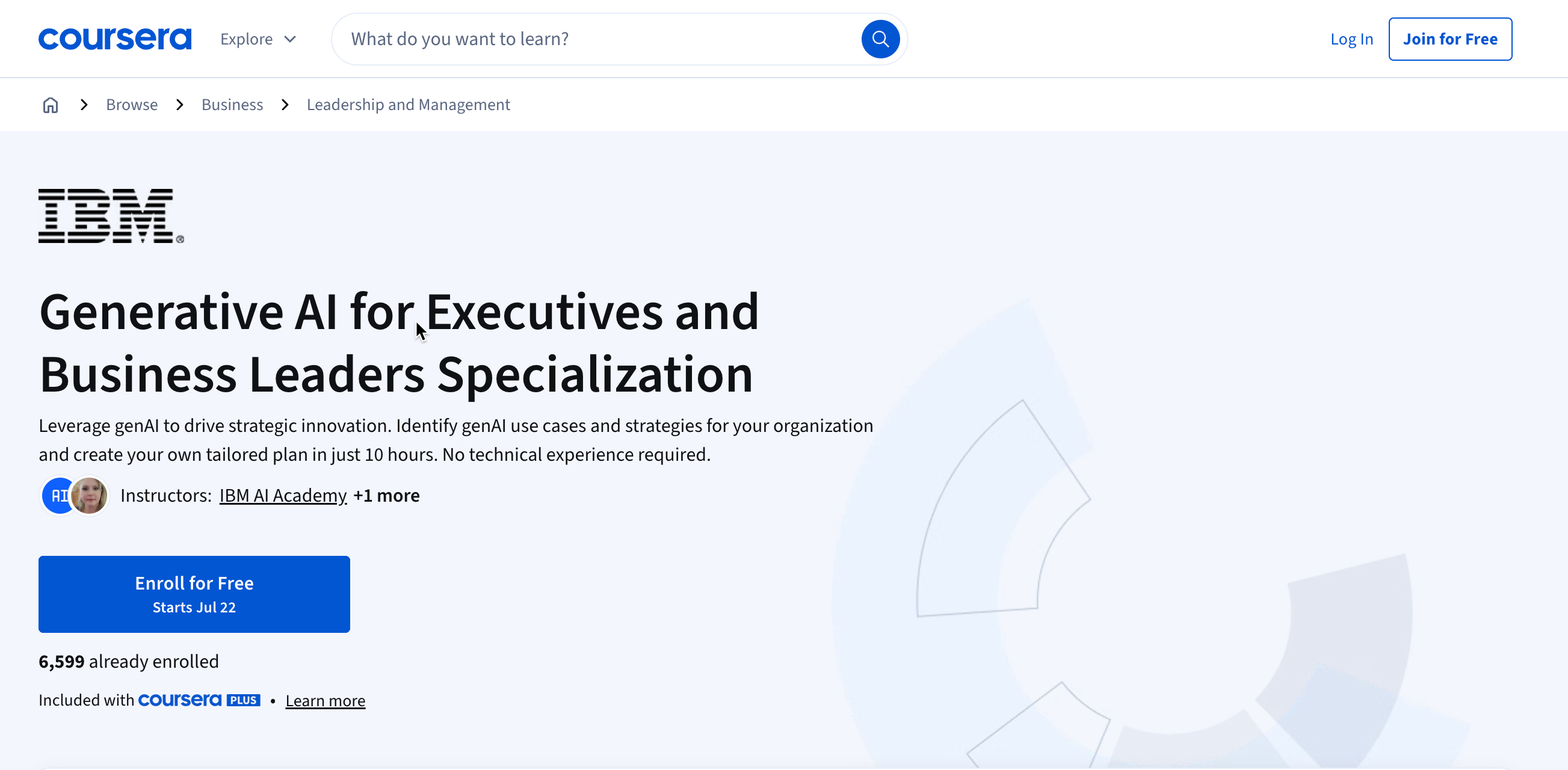Course Review: Generative AI for Executives & Business Leaders

Program Overview
Offered By: IBM AI Academy via Coursera
Best For: Executives, senior managers, consultants, and business strategists who want AI fluency—no coding required
Time to Complete: ~9 hours total (3 bite-sized courses)
Price: Free to audit; ~$49/month for certificate

What You’ll Learn
A refreshingly strategic, no-code specialization that blends generative AI fundamentals with real business outcomes—think ROI, governance, and real-world implementation. You’ll build a lightweight use case using IBM’s tools and return to work with insights you can actually use—not just theory.
This is not a technical bootcamp. It’s a business leader’s guide to navigating the AI era with clarity and confidence.
Topics covered:
- Core concepts: foundation models, fine-tuning, and ethical frameworks
- Use-case evaluation: how to identify high-ROI pilots (and which ones to skip)
- ROI & governance: risk mitigation, compliance, and success metrics
- Hands-on project: draft and shape your own GenAI use case using IBM’s watsonx platform
- Practical breakdowns: demystifying what GenAI can—and can’t—do (yet)
Skills You’ll Walk Away With
- How to use GenAI tools (ChatGPT, Claude, Bard) to accelerate content creation
- Frameworks for evaluating and scoping GenAI initiatives
- A clearer understanding of the ethical guardrails of AI-generated media
- Mental models for combining human creativity with machine intelligence
- Tools to communicate GenAI opportunities across cross-functional teams
Who It's Great For

Weekly Breakdowns
Here’s a suggested weekly breakdown for the Generative AI for Executives and Business Leaders specialization on Coursera. The full program includes three short courses (~9 hours total), making it manageable over 3–4 weeks, even with a full-time job.
Week 1: Foundations of Generative AI
Course: Generative AI for Executives and Business Leaders – Introduction
Time Commitment: ~3 hours
What to Focus On:
- Understand key terms: foundation models, LLMs, fine-tuning, hallucinations
- Explore GenAI’s role across industries (customer service, marketing, dev workflows)
- Learn how GenAI differs from traditional automation
Suggested Activities:
- Take the module quizzes (low stakes but helpful)
- Jot down 2–3 real use cases you’ve seen (or could imagine) at your company
Week 2: Integration & Strategy
Course: Generative AI for Executives and Business Leaders – Integration Strategy
Time Commitment: ~3 hours
What to Focus On:
- Aligning GenAI initiatives with business goals and ROI
- Navigating regulatory and ethical concerns
- Understanding what “responsible AI” really means
Suggested Activities:
- Draft a short 1-pager on a potential GenAI pilot in your team/org
- Join a relevant discussion forum or Slack/LinkedIn group to hear how others are approaching AI strategy
Week 3: Build Your Use Case
Course: Generative AI for Executives and Business Leaders – Formulate Your Use Case
Time Commitment: ~3 hours
What to Focus On:
- Walk through IBM’s use case template
- Learn how to scope a GenAI idea (business problem, data, risks, success metrics)
- Light exposure to prompt engineering and watsonx
Suggested Activities:
- Complete the final use case project (worth showcasing on LinkedIn or a personal portfolio!)
- Bonus: Try writing the same prompt in ChatGPT, Claude, and Gemini to see differences in model behavior
Optional Week 4: Supplement & Apply
Time Commitment: ~2–3 hours (flexible)
What to Focus On:
- Deepen skills with a follow-up course (ex: Prompt Engineering or Duke’s AI Product Management)
- Draft a presentation slide or internal doc showing what you learned and how it could apply to your team
- Add the certificate + key skills to your resume and LinkedIn
Cost and Auditing
This course follows Coursera’s standard monthly pricing model—about $49/month if you want the official certificate from IBM, which comes with a shareable credential for LinkedIn and your resume. For many learners (especially those using employer learning budgets), the certificate is worth it. It helps validate your AI literacy to hiring managers, and can boost visibility for roles that filter by keywords like “Generative AI” or “AI Strategy.”
But if you’re here to learn, not earn, there’s good news: you can audit the full course content for free. You won’t get the certificate, but you’ll still have access to all the videos, readings, and quizzes.
To audit, just:
- Click “Enroll for Free”
- On the pop-up, click “Audit the course” at the bottom of the second screen
- Skip the payment page—voilà, you’re in
Want help deciding if a certificate is worth it for your goals? Check out our guide to listing MOOCs on your resume.
Student Reviews
Ratings are solid (4.6+), though executive-level courses tend to attract fewer reviews. Industry chatter signals this specialization is appreciated for its leadership perspective rather than technical rigor.
Positive Feedback Highlights:
- Business-Relevant Focus: Learners consistently highlight the real-world applicability, especially for decision-makers evaluating where and how to implement GenAI.
- Strategic, Not Technical: The no-code approach resonates with executives and team leads who want fluency in GenAI without diving into engineering.
- Ethics & Governance Coverage: The inclusion of risk, compliance, and ethical frameworks is a standout for those navigating regulated industries.
- Watsonx Use Case Builder: The final project is praised for making abstract concepts more concrete by walking learners through a full use-case formulation.
Constructive Criticism:
- Platform-Specific Bias: Some learners note the course leans heavily on IBM’s watsonx platform, with limited exposure to tools like OpenAI or Microsoft Azure.
- Surface-Level Technical Depth: While designed for non-technical audiences, a few reviewers wanted more depth on how GenAI models actually work under the hood.
- Limited Interactivity: The format is largely self-guided; there’s little peer feedback or collaborative discussion, which some felt limited the depth of reflection.
Overall Impression: This specialization succeeds in giving senior professionals a strong strategic lens on generative AI. It’s best suited for leaders driving adoption—not those building the tools themselves. For business decision-makers looking to get smart on GenAI fast, this is a solid place to start.
Supplemental Materials
This course from IBM is a strong foundational credential for executives and business leaders who want to stay relevant as AI transforms every industry. It’s especially useful as a showable certificate for LinkedIn or internal upskilling programs, and it provides a clear framework for evaluating GenAI opportunities within your organization.
That said, if you're aiming to pivot into a more technical or hands-on AI role, you'll likely want to supplement this with courses that go deeper into product development, prompt engineering, or model evaluation. Here are a few standout options:
For AI & Product Strategy: Duke University's AI Product Management
Offered by one of the top universities in the U.S., this Coursera specialization dives into how product managers can scope, build, and lead AI-powered solutions. It’s best suited for professionals with some product background, and bridges the gap between data science and business goals. Read our full review here.
For Technical Skill Building: Udacity's NanoDegree for AI Product Management
If you’re ready to get your hands dirty with data and impact measurement, Udacity’s NanoDegree is one of the more technical, project-based options. It includes four deep-dive courses—ranging from business strategy to model iteration—and helps you build a portfolio of real-world projects. Read our full review here.
Alternative Specialization Recommendations
Note: there are tons of alternate courses on how to use ChatGPT effectively, especially on Udemy. We specifically are reviewing this one from Vanderbilt because it's a sharable certification from a renowned university.
For Prompt Engineering & Tool Fluency: ChatGPT Prompt Engineering with 2100+ Prompts
This is a great companion to IBM’s strategic view—focused entirely on prompt design, tool mastery (ChatGPT, Bard, Claude), and content generation workflows. If you want to actually use the tools your team is talking about, start here.
Conclusion
Final Take: A Smart Starting Point—But Not the Finish Line
If you’re in leadership—or hoping to move into a more strategic role—this specialization is a powerful first step. It gives you the vocabulary, mental models, and business lens needed to talk about generative AI with clarity and confidence. You’ll walk away understanding what GenAI is (and isn’t), how it fits into real organizations, and how to spot meaningful use cases with ROI.
But let’s be clear: this isn’t where your learning journey ends.
For career switchers, this course is a great way to signal your interest in AI and prove you understand the business side of the equation. It’s an excellent resume builder if you’re pivoting into AI-adjacent roles like product ops, strategic planning, marketing innovation, or even customer experience. And it pairs especially well with other certifications that focus on doing, not just knowing.
If you're serious about making a move into the AI space—whether you're coming from generalist roles, operations, or creative fields—this specialization lays the groundwork. But the next step is stacking on practical skills: things like prompt engineering, product experimentation, or model evaluation. (We’ve listed some of our favorite add-ons above.)
Bottom line:
This course helps you speak the language. Your next move is learning how to use the tools—and show you can think alongside them.
Here at Bridged we are huge fans of stacking micro-certifications to achieve desired career results, which is why we created the skill tracker. We're still in beta and building a product to make your career planning fun and affordable. We'd love to talk to YOU! Was this article helpful? Did you enroll in the course?
Let us know at hello@getbridged.co


.png)













